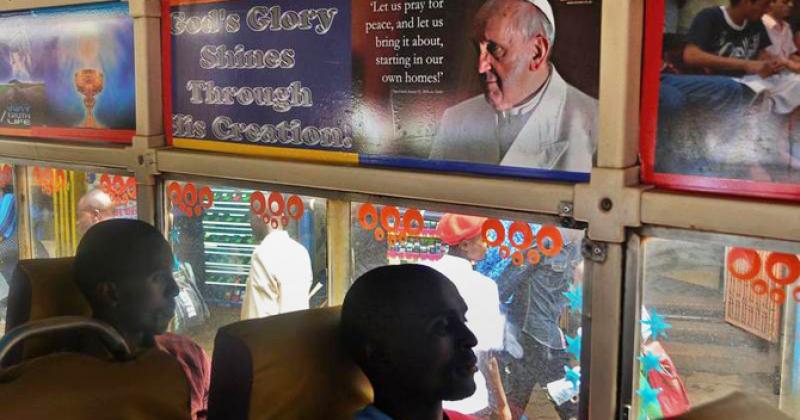Kenyans, particularly young people and those for whom the Gospel is an integral part of their everyday life, are excited by Francis’ words and gestures. Bishops have appealed against corruption and one missionary hopes the Pope will motivate people to be among the poor.
“I hope there will be room for Francis’ ‘off-the-cuff’ gestures.” Combonian missionary, Fr. Paolo Latorre, speaks to Vatican Insider from Nairobi, capital of Kenya the first of three countries Francis is due to visit on his African voyage which is to take place from 25 to 27 November. Preparations for the Pope’s visit are underway, the cleric said, “with big screens which will be used to broadcast the celebrations and a substantial security cordon [10,000 police officers are to be deployed, Ed.]. But we also want to give the Pope the chance to meet people from as many social backgrounds as possible, not just civil and religious authorities, but ordinary people too.” Efforts have evidently been made in this direction judging by the packed schedule that awaits the Pope: institutional meetings, a visit to the local UN headquarters, a youth gathering at the stadium and mass at the university campus which, together with nearby Uhuru Park and Central Park, can hold up to one million people.
The Kenyan Church will be raising issues close to the Pope’s heart at these events: “We will reflect on the values of hard work, honesty, integrity and responsibility, national unity and respect for the law,” says in the latest message issued by the national Episcopal Conference ahead of the Pope’s visit. Of particular concern is the “terrible scourge of corruption, the escalating thefts of state funds by those entrusted with public resources.” Bishops oppose this, recalling the “values that form the foundations of our nation, which our ancestors fought and gave their lives for”. Fr. Latorre adds that the local Church (with almost 14 million faithful, more than 32% of the population) “is now able to stand on its own two feet but besides funds and structures, what is needed is also a life of faith, which is still “young” here. New denominations – which are no longer Catholic – are constantly popping up and placing a great deal of emphasis on the financial aspect: their pastors often speak of Christ in too “speculative” a manner. One of the expectations of Francis’ visit, the missionary says, is an invitation for a renewed Christian effort.
“We as missionaries and the faithful we speak with every day,” he continues, “hope that the Pope will give us his blessing and the motivation to be among the poor and the abandoned, a choice that not everyone quite understands yet, even though the gap between rich and poor is enormous.” As such, the Pope’s visit to Kangemi, one of Nairobi’s many slums (practically half of the city’s population lives in these slums), is of great significance. This decisions has aroused many fears regarding security but Latorre, who spent part of his mission in Korogocho, one of these “informal settlements”, as they are called, called the Pope’s scheduled visit to the slums a “significant gesture”. If anything, the risk is posed by other changes: the authorities “are transforming the Kangemi area into an environment fit to welcome the Pope, while Francis probably wants to see people’s real living conditions.”
At first glance, therefore, the suspense ahead of Francis’ visit resembles that which preceded the visit of a world leader of a very different character: Barack Obama. The US President went to Kenya - his father’s homeland - in July, but the mood of the eve of his visit was very different: “In Obama’s case, we were waiting to welcome a son of the nation, a descendent of one of the ethnic groups that historically have competed for power. The focus was on certain political issues he may have addressed; in the Pope’s case things are different, the excitement is down to what the Church is doing, the changes it is implementing.” The Church’s gestures and declarations, the Combonian priest concludes, “have an impact especially on the young and those who live the Gospel in contact with the people.”
